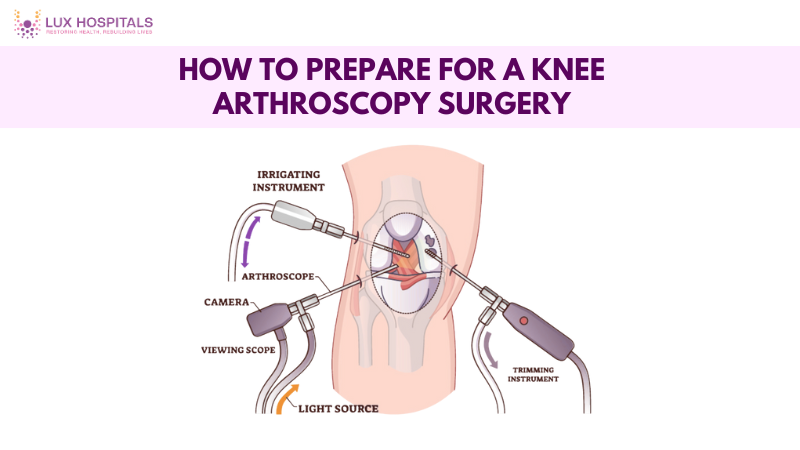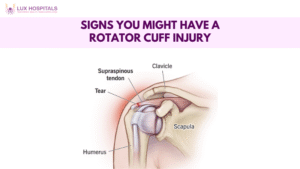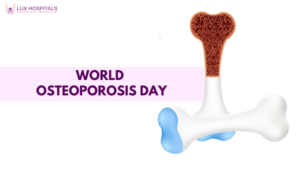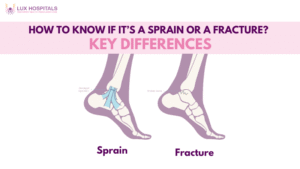How to Prepare for a Knee Arthroscopy Surgery?

Knee arthroscopy is a standard surgical procedure used to treat knee problems, including torn ligaments, cartilage damage, and persistent knee pain. Since it is minimally invasive, recovery is faster than traditional open surgery. However, proper preparation is the key to getting the best results. In this blog, we’ll guide you step by step through the preparation for knee arthroscopy, what to expect, and how to recover with ease.
Understanding Knee Arthroscopy
During a knee arthroscopy, a tiny camera (arthroscope) is inserted into the knee joint. The surgeon uses this tool to see inside and repair damage using small instruments. It is often used for meniscus tears, ligament injuries, and cartilage damage. Because it involves minor cuts, it usually heals faster than larger surgeries. Knowing the basics helps patients feel more confident and less nervous.
Why Preparation is Crucial for Knee Arthroscopy Surgery?
Preparing for knee arthroscopy is not just about the surgery itself—it’s about ensuring a safe experience and a faster recovery. Patients who prepare properly often heal quickly, have fewer complications, and feel more comfortable during the process. Preparation also helps reduce stress, as you’ll know what steps to follow before and after the surgery.
Medical Checkups Before Surgery
Before knee arthroscopy, your doctor will recommend tests to ensure you’re fit for anaesthesia. These usually include:
- Blood tests to look for deficits or infections.
- ECG if you have heart conditions or are older.
- X-rays or an MRI to understand the exact knee issue.
These evaluations help your surgeon plan the safest surgery for you. If you have conditions like diabetes or high blood pressure, they must be well-managed before the procedure.
Medications to Adjust
Many patients take regular medications, but not all are safe to use before knee arthroscopy. Aspirin and warfarin are examples of blood thinners that can raise bleeding risks and are usually stopped a few days before surgery. Even some herbal supplements, such as ginseng or garlic pills, can affect blood clotting. Always inform your doctor about all medications you are taking so they can provide you with proper guidance.
Diet and Fasting Before Surgery
Eating right before knee arthroscopy helps prepare your body for a successful recovery.
- ‘Consume a well-balanced diet high in vitamins, minerals, and protein to aid in recovery.
- Steer clear of alcohol and junk food since they can slow healing.
- Do not eat or drink anything 6–8 hours before the surgery if anaesthesia will be used.
This reduces risks during the procedure and supports a stronger immune system.
Exercise and Physical Preparation
Your doctor may recommend light exercises before knee arthroscopy. These “pre-hab” exercises help strengthen the muscles around your knee, making recovery easier. For example, straight-leg raises, gentle cycling, and stretching all improve flexibility and stability. Always check with your surgeon or physiotherapist before starting new exercises.
Planning for Post-Surgery Care
Recovery is smoother when you prepare your home in advance for knee arthroscopy.
- After surgery, make plans for someone to drive you home.
- Keep essentials like water, medicine, and snacks within easy reach of your bed or chair.
- Use crutches or walkers as recommended by your doctor.
- Remove any barriers that could create a safe environment at home and cause you to trip and fall.
This preparation avoids unnecessary stress after surgery.
Managing Anxiety and Stress
It’s normal to feel nervous before knee arthroscopy, but being prepared can help reduce your fear. Learn about the procedure by talking to your doctor and asking questions. Practice deep breathing, meditation, or simple relaxation techniques the night before to help you relax. A calm mind helps your body heal better and makes the entire process easier.
The Day Before Surgery
The day before knee arthroscopy, follow these steps carefully:
- Take a shower with antibacterial soap if recommended.
- Dress comfortably and loosely so that you can easily take them off.
- Confirm the surgery timing and fasting instructions with your healthcare provider at the hospital.
- Pack your ID, medical reports, and prescribed medicines.
This ensures you won’t face any last-minute stress or confusion.
What to Expect on Surgery Day?
When you arrive at the hospital for knee arthroscopy, you’ll be checked in and prepared for anaesthesia. Nurses will clean and mark the surgical area. The anesthesiologist will explain how you’ll be kept comfortable during the procedure. The surgery typically lasts 30–60 minutes, and in most cases, you can return home on the same day.
Post-Surgery Recovery Tips
Recovery after knee arthroscopy is generally faster than open surgery, but you still need to follow guidelines:
- Rest and keep your leg elevated.
- Use ice packs to reduce swelling.
- Attend physiotherapy sessions to regain movement and strength.
- Avoid heavy lifting or running until your doctor allows you to do so.
Following these steps helps you heal more quickly and reduces the risk of long-term complications.
Conclusion
Preparing for knee arthroscopy is simple if you take the proper steps in advance. From medical checkups and diet changes to planning your recovery space, every detail matters. With adequate preparation and expert guidance from Lux Hospitals, you’ll feel more confident, recover more quickly, and return to your daily routine smoothly. Always follow your doctor’s advice for the best results. With proper preparation and postoperative care at Lux Hospitals, patients can return to normal activities faster, experience less discomfort, and enjoy long-term benefits from the procedure.
Frequently Asked Questions
To prepare for knee arthroscopy, follow your doctor's instructions regarding medications, fasting, and any necessary tests. Consume a healthy diet and engage in regular exercise. If approved. Arrange for someone to help you after surgery for comfort and safety.
Before knee arthroscopy, avoid fatty foods, alcohol, and sugary snacks that can slow healing. Do not eat anything 6–8 hours before surgery if anaesthesia is required. Stick to light, nutritious meals the day before.
Recovery after knee arthroscopy varies from patient to patient. Most people can walk within a few days, but full recovery may take 4–6 weeks. Following physiotherapy and your doctor's instructions is crucial to a faster recovery.
Many patients can walk with support shortly after knee arthroscopy, depending on the surgery performed. However, crutches may be required for a few days. Always follow your surgeon's recommendations regarding the amount and timing of your walking.
Knee arthroscopy is considered a minor, minimally invasive surgery compared to traditional open knee surgery. It requires only small incisions, and most patients go home the same day. However, it still requires preparation and proper recovery planning for the best results.




















